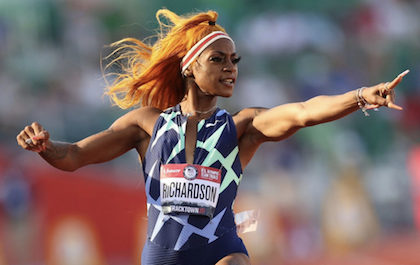
Credits: Patrick Smith, Getty Images
Three years ago, American track and field athlete Sha’Carri Richardson was set to compete in the 100-meter dash and relay race at the 2021 Olympics in Tokyo. Shortly after the Olympic trials ended—and just one week after the death of her mother—she tested positive for cannabis. As a result, officials suspended her from the team and barred her from competing. She was also made to complete a substance abuse program.
Though she was not able to represent America then, Richardson will return to the track this summer in Paris for the 2024 Olympics.
What Happened Before Tokyo?
Many admire Richardson, a queer Black woman, not only for her record-breaking speed, but for her bright personality and appearance, competing in her trials with her hair, makeup, and nails done. Among her fans and supporters are athletes and politicians, such as Democratic Representative from New York Alexandria Ocasio-Cortez, and President Obama.
At the 2023 World Championships in Budapest, Richardson became the “fastest woman in the world with a time of 10.65 second,” the Olympics writer Eleanor Lee reports. This year, the 24- year-old clocked a world lead time of 10.71 for the 100m in Eugene, Oregon.
In June of 2021, Richarson’s required drug test for the Olympics showed a positive result for cannabis use. She admitted to consuming an edible after the passing of her mother in her home state of Oregon where recreational cannabis use is legal.
She told The New York Times at the time: “It [losing her biological mother] sent me into a state of emotional panic… I didn’t know how to control my emotions or deal with my emotions during that time.”
She asked the public on an NBC interview not to judge her because, “I am human…I’m you. I just happen to run a little faster.”
Who Makes the Rules?
Rules around substance use in athletes are extremely tight, especially when it comes to Olympic athletes.
The U.S. Anti-Doping Agency (USADA) is a signatory to the World Anti-Doping Agency (WADA) for the United States Olympics, Paralympic, Pan American and Parapan American sport. Their job is to enforce rules relating to substance use for Olympic athletes. Its mission is to “stand with athletes to champion their right to clean sport…[and] promote the integrity of sport” by “managing the anti-doping program, including in-competition and out-of-competition testing, drug reference resources,” and more.
Each year, the USADA publishes a handbook detailing prohibited substances, exceptions, testing information, and more resources for competing athletes.
In 2021, as well as in 2024, the agency prohibits nearly all cannabis products, with the exception of CBD. The 2024 handbook advises that athletes are “extremely cautious with these products” as it is almost impossible to have pure CBD extract without traces of other substances, like THC.
The WADA considers cannabis to be a performance enhancing drug. To be included on the WADA Prohibited List, “the substance must meet two of the three inclusion criteria: 1) It has the potential to enhance performance; 2) it poses a health risk to athletes; and 3) it violates the spirit of sport.”
Though the WADA admits in their “Marijuana FAQ” section that “there is not rigorous evidence that clearly demonstrated performance enhancement,” from cannabis use, their committee unanimously feels that cannabinoid use violates the second and third criteria.
Richardson was not the only athlete that the USADA suspended in 2021. Swimmer Tate Jackson and track and field runner Kahmari Montgomery also tested positive for THC. All three athletes faced the same consequences put forth by the USADA, an “absolute minimum…one-month sanction and disqualification.”
Support for Richardson and The Larger Issues
Richardson’s case in 2021 raised many questions on the fairness and origins of these rules.
Institutions like the International Olympic Committee (IOC) have faced backlash,forcing them to revisit their guidelines, such as the banning of swim caps made for people of color.
At the time, Ocasio Cortez said on X that Richarson’s suspension has roots in racist ideologies.
In her message of support for Richardson back then, she mentioned the racial undertones to these rules. “The criminalization and banning of cannabis is an instrument of racist and colonial policy…This ruling along w/ IOC denial of swim caps for natural hair is deeply troubling,” she said.
“Their decision lacks any scientific basis,” AOC tweeted. “It’s rooted solely in the systematic racism that’s long driven anti-marijuana laws.”
Heading to Paris
Richardson has doubtlessly worked her entire life, but particularly these last three years, to claim her world-record title and ticket to the Paris Olympics. After her 2023 win, Richardson’s mantra has been, “I’m not back, I’m better,” saying that this experience is “a full circle moment.”
She credits her teammates for her success, as well, especially “those building conversations where we compliment each other’s talents…but also…those uncomfortable conversations where we hold each other accountable…”.



Leave a Reply